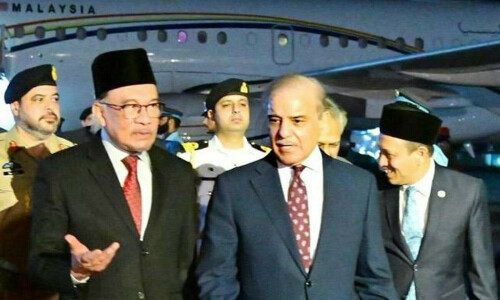ISLAMABAD: Evolving standard trade procedures is the only way to increase trade volumes and reap the benefits of South Asia Free Trade Agreement (Safta), speakers at the 8th South Asia Economic Summit stressed on Monday.
The two-day conference, titled ‘Regional Cooperation of Sustainable Development in South Asia’ has been organised by the Sustainable Development and Policy Institute (SDPI).
Experts criticised the policy makers and political leadership of the region for stagnant trade volumes in South Asia which have hovered around five per cent for years.
Federal Minister for Planning and Development Ahsan Iqbal said there was hope that relations between India and Pakistan will improve following the meeting between the two prime ministers at COP21 earlier this week.
On the occasion, he highlighted the reasons for which 80pc of China-Pakistan Economic Corridor’s $46 billion investment was focused on power and energy projects.
Speakers highlighted that mega projects including the Turkmenistan-Afghanistan-Pakistan-India (TAPI) pipeline and Central Asia and South Asia Electricity Transmission and Trade Project were given highest priority by Pakistan and they would eventually help in the development of the whole region. It was stressed that Safta will become operational by 2020.
United Nations Economic and Social Commission for Asia and Pacific (UNESCAP) India’s Nagesh Kumar stressed the need for cooperation.
While most speakers highlighted growth opportunities in the region and the options for collective growth in South Asia, a guest from Nepal criticised the political leaderships of India and Pakistan.
“Saarc has become a casualty due to the nature of relations between India and Pakistan,” said Dr Rajan Bhattarai, Member of Constituent Assembly and Legislative Parliament, Nepal.
He highlighted the role of economy in terms of sustainable development and enhanced cooperation in the South Asian context. He stressed that policy making in the region remains guided by other issues and not economic growth.
Suraj Vaidya, President-In-Charge of Saarc Chamber of Commerce and Industry, called for immediate removal of trade barriers, especially between India and Pakistan, for meaningful progress.
UNESCAP-Bangkok’s Economic Affairs Officer, Rajan Sudesh Ratna emphasised the need to reduce duties in Safta to zero and liberalise services and investment for economic integration of south Asia.
SDPI Executive Director Dr Abid Qaiyum Suleri said that South Asia was a region with multiple interstate and intrastate conflicts. Finding an opportunity for public thought leaders to objectively discuss the regional issues is a big success, he added.
Published in Dawn, December 8th, 2015














































